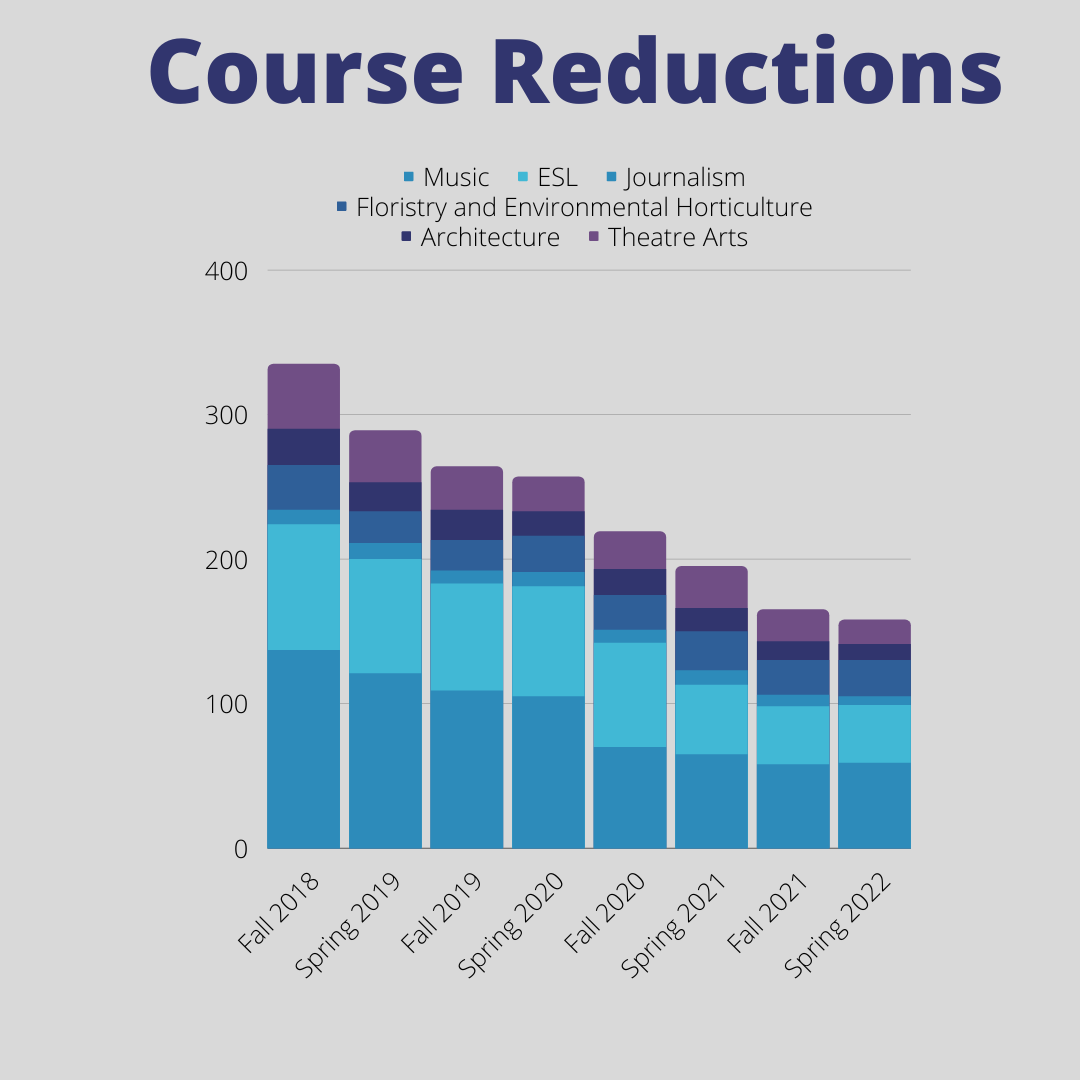Death by a Thousand Cuts: Slashing of Programs Undermines City College’s Mission and Future
By Julie Zigoris
Thirty-eight full-time City College faculty members have received pink slips, with a total of 219 personnel lost out of a total of 458 in the impacted departments. The near 50% reduction in selected departments comes after years of course cuts that have left some programs on life support or shut down entirely.
Some of the hardest hit departments include: English as a Second Language (ESL), Architecture, Music, Theatre Arts, Environmental Horticulture and Floristry, Automotive Construction, Business, Counseling, Physics, French and Aircraft Maintenance Technology.
The massive shrinking of some of the most successful — and important — programs at the school is driving an enrollment crisis that prompts further cuts, fueling what some instructors are calling a death spiral.
ESL is withstanding some of the most severe reductions, despite their essential service in training citizens of San Francisco to contribute to the workforce. Débora Radaic, an ESL student from Brazil who started City College in 2017, gave an emotional appeal to a crowd gathered for a March 15 rally protesting the massive program cuts across the school. “City College made me feel that I’m someone,” Radiac said, recounting how she didn’t know how to say hello or shop for groceries before she began her ESL education. “City College gave my voice back,” she said, with tears in her eyes.

At an April 13 rally at the North Beach/Chinatown City College campus, the ESL Department Chair spoke of the importance of non-native English speakers to the fabric of the City. “We’re Baghdad by the Bay,” said Jessica Buchsbaum. “Immigrants built this city.”
Buchsbaum contends that when residents speak better English, they can participate more in life, which brings in more tax revenue and creates a more engaged citizenry. In short, it’s good for everyone.
With all the program cuts, it has been increasingly difficult to run a viable program, according to Buchsbaum. She noted the loss of vocational ESL classes, important programs that help new citizens of San Francisco move into positions in healthcare and other industries. The cuts are disproportionately hurting low-income and BIPOC students, according to Buchsbaum.
“It’s been really devastating, she said.

While the administration cites budget woes as a reason for the cuts, Buchsbaum claims she has enough budget to schedule all of her full-time faculty. “It’s the most maddening piece,” she said. “Why are they laying them off when I have all these classes I need to staff?” Other organizations, like the AFT 2121, have pointed to the budget surplus projected for fiscal year 2023 when asking why such extreme cuts are necessary at this time.
Kate Frei, a citizenship coordinator in the ESL department, noted that of her eight teachers, six are slated to be laid off, and three-quarters of them are Chinese bilingual speakers. “Citizenship is unique in ESL in that the content is dictated by a test,” Frei said. “Having support for this test in your first language is super important.” There are more than 50,000 residents eligible for naturalization in San Francisco, according to Frei.
Lynn Tan, one of the teachers who received a pink slip, has taught at City College for 20 years and has up to 150 students in her citizenship classes.
Buchsbaum also noted that the cuts violate the idea of tenure, according to California’s Educational Code Laws. “They will have a much bigger fight than just at our college,” she said.
Theatre Arts Instructor Patricia Miller, who is responsible for teaching the entirety of the acting program, received tenure and a pink slip within the same month. With her position eliminated, the acting certificate will also disappear.
“There really won’t be a department because you can build a set and design costumes, but if you don’t have actors on the set, then you don’t have a production,” Miller said. “It’s an unofficial way of deactivating the department without going through the academic senate.”
“There’s no incentive to increase enrollment,” said Ronald Richardson, an instructor in the English department. “So that’s why it’s okay to continue to cut classes, which causes enrollment to fall, which causes us to cut more classes, which causes enrollment to fall, leading us into a death spiral that is going to jeopardize all of our jobs,” Richardson continued at a Feb. 17 budget forum. Similar to Tabarracci, Richardson also had the dizzying experience of receiving tenure and a pink slip in the same academic year.
Journalism Department Chair Juan Gonzales is also concerned the massive cuts are driving away students, who have to take longer to complete degrees or certificates because classes aren’t offered as frequently. It ends up reflecting poorly on the department, since fewer students are completing the program. “There have been cuts and cuts and cuts. And the college cuts across the board. Even if you’re a small department you have to share the burden,” Gonzales said. The cuts are felt more by a smaller department, according to Gonzales, since the loss of only one or two courses can have a dramatic impact.
“When students don’t see as many options, they look elsewhere. That causes enrollment to go down. It starts this cycle that is really getting deep now,” said Richardson.

Shana Lesch, a student in the Environmental Horticulture and Floristry Department, is devastated by the loss of her teacher Tabarracci, who received a pink slip — and tenure — in the same year. “The department is slowly going to disintegrate, and I know that it’s been around for more than 60 years,” Lesch said. She looked around for other programs where she might be able to study what City College offers. Her dream is to start her own floristry business, which the school has made happen for other students, but she has found nothing similar. “It’s really the last school of its kind,” she continued. With these program cuts, her dreams disappear, too.
“They’re discontinuing programs illegally,” said Environmental Horticulture and Floristry Department Chair Steven Brown. “People become disinterested because they can’t finish what they started.”
According to Brown, there is not enough support from the school to promote programs. He has paid out of his own pocket to advertise courses, because the school hasn’t sent out postcards or course schedules — any promotional materials — to try to drive enrollment.

Some students, like journalism major Katherine Castillo, have been advised to take classes elsewhere to close the gap in offerings at City College. Castillo was also able to secure a note from her counselor for a class substitution in addition to covering various gaps in City College’s offerings by taking classes at Marin College. Without these two strategies, she would have had to wait an entire extra year to graduate.
“It’s very stressful for us students to know what to do when they can’t find the class that they’re looking for,” Castillo said. She credits her counselor Anastasia Fiandaca for getting her through her City College experience. “I couldn’t have made it without her. She has been my angel,” she said.
Yet even such counselors, so vital to a student’s success especially in light of the disorienting cuts, are on the chopping block. Michael D’Lalosio, a counselor who works specifically with students who are veterans, had his position terminated this year, according to student Laura Cohen. “There’s a lot of people who will have nowhere to go without him,” she said of D’Lalosio’s loss.
Cohen, a Japanese major, is also concerned her program will be cut entirely. She notes other losses for the school: a restaurant in the Mission where Culinary Arts students would train that closed and the loss of senior programs. “I don’t think people in the city understand enough about the services at the college,” Cohen said. She found a part-time job as a florist thanks to a connection she made in a City College course.
The massive course cuts impacted Eric Nyeste, a student in the biology department, when he realized he could not take the accompanying lab for his environmental science course. The scheduling threatened to put into limbo his University of California college application.
“It’s probably the most topically appropriate discipline at City College,” Nyeste said of the environmental science program. “And it’s going away because of budget restrictions. But they’re going to continue to teach environmental economics, which is a class that’s so irrelevant to what we’re going through right now.”
“It’s just mind boggling. How departments are getting funded. And who’s keeping their jobs,” Nyeste continued.
Another City College student, Ainslee Tilbrook, lost her job as a teacher’s aid when her class — upholstery — was cut, despite its overwhelming popularity. The single section of the course had grown to five due to intense demand. There were always at least 60 to 100 people on the waitlist for the course, according to Tilbrook.
“This was the most bizarre thing ever, in my mind, why would they cut a class that always had a waitlist?” Tilbrook said.
The class was a perfect microcosm of what City College is meant to be, an institution serving the learning needs of its diverse community. “It was for students who were serious about upholstery, quite a few of them still do upholstery and some have their own little businesses,” Tilbrook said. “We had a woman who was 85 and it was the one thing that got her out every week. It was something that made her feel alive,” she continued. “There were all ages, all races, all professions. Straight, gay. Full-time.”

The cuts are impacting some of the most popular departments at the school, like music and environmental horticulture and floristry. “We just kept going down and down and down, and I just shriek and howl and yell about get the damned data right,” said Madeline Mueller, chair of the music department, whose program has been cut nearly 75% by her estimate, despite student demand.
The frustration on the part of many department chairs is that lower enrollment is being used as a rationale by the administration for course cuts, even as the very courses they’re cutting is what is making it difficult for students to complete their programs and so lowering enrollment. “It’s the wrong end of the telescope,” Mueller said.
Mueller asserts it’s a schoolwide issue, pointing to the Theatre Arts department that has been reduced 52% in the last three years, according to her calculation. “We’re getting shut down,” said Miller at the April 13 rally.
Indeed, no program at the school appears immune from the cuts, no matter the size, popularity, or subject matter. Some programs, like older adults and non-credit business courses, have been cut entirely. Others, like architecture, lost ten positions through cuts.
Brown, who had his operational budget cut by more than 75%, does not think the administration is holding up their end of the bargain. “For 40 years they agreed to have this program and all of a sudden you’re not going to support it?”
The cuts prompted a March 23 resolution by the San Francisco Democratic County Central Committee (DCCC) to oppose the downsizing. “The College is now rapidly losing its ability to provide necessary classes and job training to support the City’s economic recovery,” said the resolution, sponsored by Peter Gallotta, John Avalos, Anabel Ibanez, Li Lovett, and Carolina Morales.
With the massive cuts come major losses. Businesses not opened, citizenship not gained, languages not learned, dreams not met. The cuts disproportionately impact women and students of color, the very students that City College is charged to serve. The cuts are happening across the campus, to some of the most popular departments with the most sought after classes.
The cuts are necessary according to the Board of Trustees in order to close the $65 million deficit in City College’s budget, and the administration points to the ongoing struggle with enrollment — which has dropped nearly 50% over the last few years — as a rationale for the cuts. The Board has not responded to AFT 2121’s alternative budget that prevents any faculty eliminations.
“It all raises the question what will City College look like in the next five to 10 years? Will its role and its mission change as a result? And who will be served?” Gonzales said.
This article was produced for JOUR 35: Data and Multimedia Journalism Spring 2022 semester with guidance from instructor Alex Mullaney and editing from The Guardsman staff.
